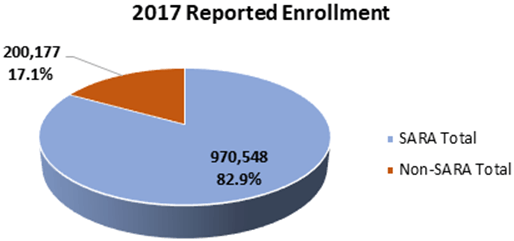NC-SARA Institutions Report Enrollments
Published by: WCET | 9/18/2017
This week we are excited to work with NC-SARA to release two NC-SARA documents, the 2017 enrollment report and a paper comparing NC-SARA enrollments to IPEDS data from 2015.
Today on Frontiers we welcome Marshall Hill, Executive Director of NC-SARA, to provide an introduction to those documents. Thank you Marshall!
Enjoy the day and enjoy the read,
~Lindsey Downs, WCET
We are pleased today to release two documents relating to SARA: NC-SARA 2017 ENROLLMENT REPORT and a short paper that compares those reported enrollments to 2015 IPEDS distance education data — NC-SARA Reported Enrollment Mirrors National Distance Education Data with Some Notable Exceptions.
Both reports were prepared for NC-SARA by Terri Taylor Straut, Senior Research Analyst at WCET (the WICHE Cooperative for Educational Technologies).

The two documents, based on fall 2016 distance education enrollments reported to NC-SARA in the spring of 2017, summarize and analyze the reported enrollments of 1,477 SARA institutions.
Those institutions reported combined out-of-state enrollments of 1,170,725 students.
The majority (82.9%) of reported enrollments were in SARA states; 17.1% were in the three states that were not SARA members at the time of reporting (CA, FL and MA).
The institutional response rate for the enrollment survey was 98.9%; non-responding institutions have been contacted and have committed to report in the future.
| Reported Enrollment in SARA States | Reported Enrollment in Non-SARA States | Total Reported Enrollment | |
| 2017 Reported Enrollments | 970,548 | 200,177 | 1,170,725 |
| Enrollment % | 82.9% | 17.1% | 100% |
SARA institutions each spring report their enrollment data to NC-SARA. These analyses cover the second annual reporting period. An Excel file of the reported data is available on the NC-SARA website.
As of today, 48 states, the District of Columbia and the U.S. Virgin Islands are members of SARA; in addition, Massachusetts has passed SARA-enabling legislation. More than 1,600 institutions participate in SARA.

Marshall A. Hill
Executive Director
NC-SARA
